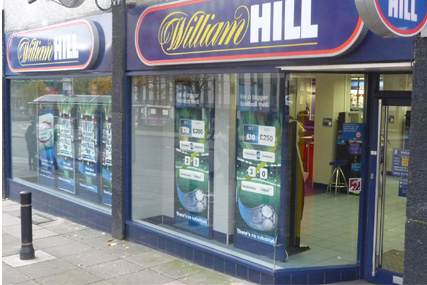
Once synonymous with nicotine-stained lino and curiously small pencils, William Hill is attempting to revitalise its image online.
After hiring former Yahoo! marketer Kristof Fahy at the start of the year, and parting ways with its ad agency, The Brooklyn Brothers, the brand is now looking to overhaul its digital strategy.
On the high street, there's no doubting the chain's clout. It has more than 2200 branches, comfortably outstripping its main rivals, Ladbrokes and Coral. However, the world of gambling is changing fast - in recent years online upstarts have made a lot of noise.
Internet betting remains a small part of the sector, but it is growing rapidly. The shift online is also open-ing up additional forms of gambling. Internet poker has attracted a wide range of players, and casino games are now expanding, too, with brands such as PartyPoker and Intercasino building their market share.
While William Hill has an online presence, it has been slow to join the internet party. 'I think it's fair to say it lost its way about three years ago,' says Warwick Bartlett, chief executive of Global Betting & Gaming Consultants.
He points out that the company tried to develop its own software, only to abandon the project and write off £26m in the process.
However, in 2008 it agreed a deal with online gambling specialist Playtech, purchasing an affiliate marketing business, customer-services operation, gaming brands and websites, and signing up for a five-year software licence for poker and casino games. Playtech owns 29% of William Hill Online. As a result, says Bartlett, the brand is 'finding its way again'.
Online ascent
William Hill's trading figures confirm the importance of online to the company. Its overall revenues rose 4% in 2009 to £997.9m. The results incorporated a 4% fall in offline revenues, but a 63% leap in those for the William Hill Online division, to £203.5m. In the process, the latter overtook Ladbrokes, for which egaming revenues slipped 7% to £161m.
On paper, the figures look good, but experts agree that there is still work to be done on William Hill's online brand. It is viewed as old-fashioned; one source close to the brand describes it as 'quiet and serious' in an online environment that is 'noisy and fun'. He cites issues with internal culture and legacy systems that have made it hard for the company to adapt.
Jason Goodman, partner at ad agency Albion, which works with Betfair, insists that William Hill is 'not a go-to brand for new betting experiences'.
William Hill's strengths are its heritage, its Britishness and its position as a trusted brand. The last of these is a key factor for gambling firms, with consumers relying on them to pay out when they win. However, online is the most popular form of gambling among younger consumers. 'First-hand experience of William Hill stores is not relevant for a 25-year-old,' says Paul Houlding, managing partner at ad agency Isobel, which works with online rival Intercasino.
In its favour, William Hill has responded well to some online trends, not least the rise in consumers watching TV on their laptops. For betting brands, the opportunity lies in allowing them to bet as they view - on football matches or X Factor results, for example. To this end, William Hill secured a deal with ITV last month to offer viewers betting opportunities via a dedicated microsite housed within ITV.com.
The other good news for William Hill is that, although it has plenty of rivals already operating in the online gaming sphere, their marketing activity is still fairly rudimentary. 'They use incredibly unsophisticated communications,' says Houlding. Marketing tends to be based on offers or the size of jackpots, he points out, and 'there aren't many gambling companies that treat you with a degree of intelligence'.
However, this is starting to change. Goodman points to the 'Betfair Front Room', which uses Twitter and blog functions to help build a community. Intercasino is also trying to strengthen its brand, and recently launched a TV campaign backing a 'win a trip to space' promotion. Ryan Henderson, head of online and offline acquisition at Intercasino, says that after a period of restructuring last year, the company is keen to engage with its customers. Future activity includes greater CRM and a push into video. 'The days of putting a display ad on MSN and getting traffic are over,' he adds.
It is clear, then, that William Hill's Fahy faces a major challenge. He has to find a suitable digital positioning for the brand that distinguishes it from the noisy start-ups. Then he has to have the team to deliver it. However, there is still room for the brand online. While it may be a late arrival on the pitch, there is still plenty to play for.
ONLINE GAMBLING
Data from the Gambling Commission shows that remote gambling (via online, mobile or interactive TV) is a small but growing market.
In 2008 9.7% of the population gambled remotely, up from 7.2% in 2006. However, this includes the National Lottery, which is the biggest driver of growth.
The most popular non-Lottery form of remote gambling is betting, with 2.4% of people engaging in this activity in 2008. By comparison, in 2007 17% of the population bet on horse races.
5.6% of Britons gambled remotely in 2008 (excluding the Lottery), up from 5.1% in 2006

